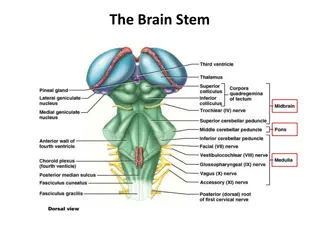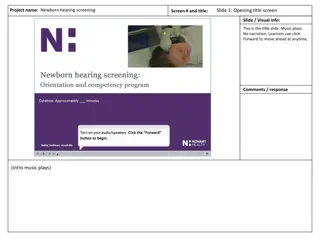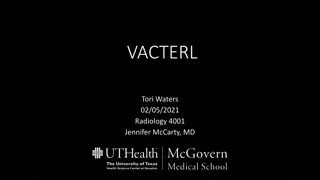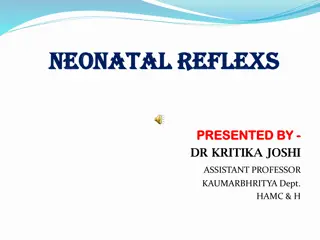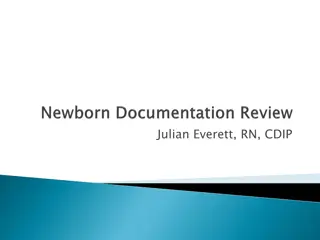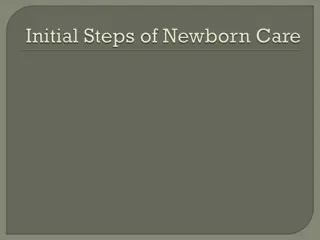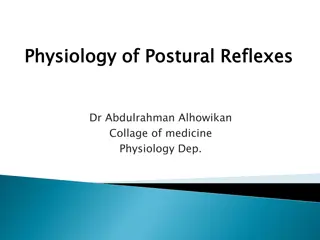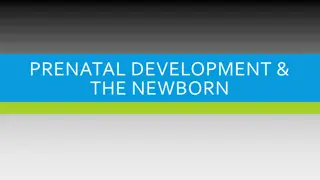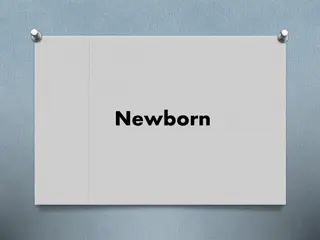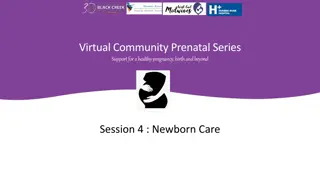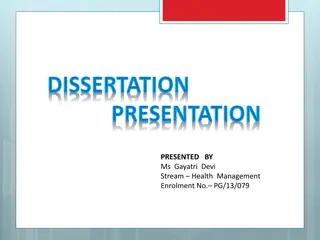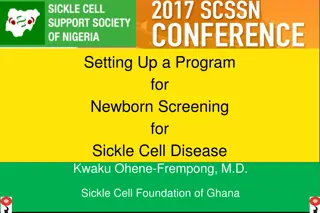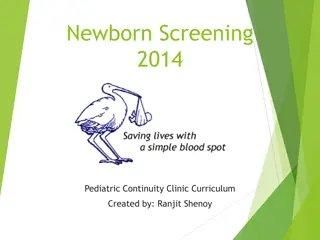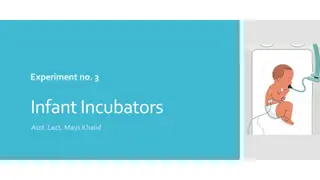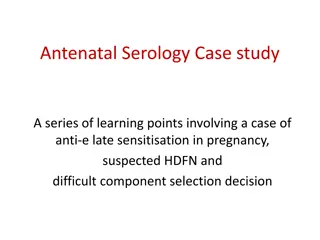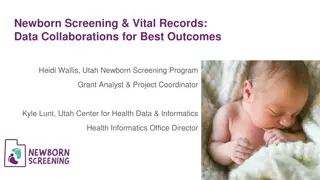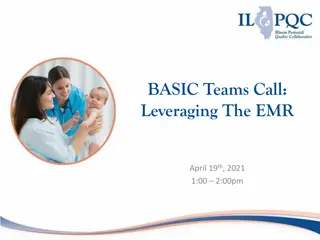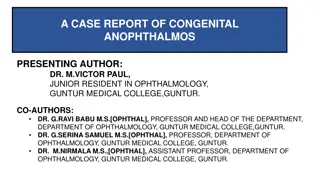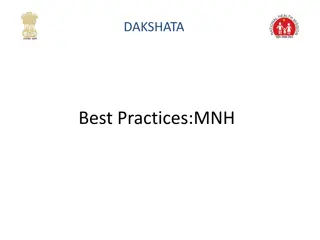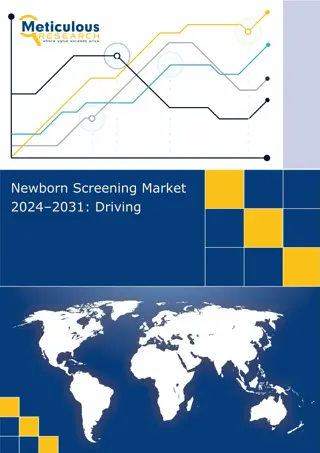Understanding Newborn Screening in Oklahoma
Newborn screening in Oklahoma is crucial for detecting hidden disorders in newborns that may not be apparent at birth. Early detection through screening can lead to timely treatment, ensuring healthy development and potentially saving lives. The process involves testing every newborn for harmful con
1 views • 88 slides
Understanding the Brain Stem and its Functions
Explore the intricate structures of the brain stem, including the midbrain, pons, and medulla oblongata. Learn about the functions of the cerebellum, its role in controlling postural reflexes and producing skilled movements. Discover the thick tracts connecting the cerebellum to the brain stem and t
8 views • 20 slides
Understanding the Brain: Stem, Midbrain, Pons, Medulla, and Cerebellum Functions
Explore the complex structures and functions of the brain, including the brain stem, midbrain, pons, medulla, and cerebellum. Discover how these regions play crucial roles in controlling reflexes, movements, and vital functions like respiration and posture. Learn about the thick tracts connecting th
7 views • 21 slides
Newborn Hearing Screening Program Overview
The Newborn Hearing Screening Project aims to educate healthcare professionals on the importance of early identification of hearing loss in infants. The program discusses the significance of timely intervention, the impact of undetected hearing loss on child development, and provides guidelines for
0 views • 15 slides
Newborn Screening Market Share to be Worth $2.69 Billion by 2031
Newborn screening is a screening program for infants under which pre-symptomatic congenital conditions are detected so that treatment can be commenced as soon as possible to prevent or reduce the long-term consequences of the disease. These programs are usually run by the national or state governing
0 views • 3 slides
Case Study: VACTERL Association in a Newborn Female with Imperforate Anus
Newborn female with VACTERL association, imperforate anus, and perianal skin tag identified at birth. Patient transferred for surgical intervention and further workup due to associated abnormalities. Imaging studies show multiple sacral vertebral anomalies. Differential diagnosis includes genetic sy
0 views • 16 slides
Understanding Patterns of Behaviour in Zoology: An Overview
Behaviour in animals encompasses a wide range of responses to stimuli in their environment, with patterns that can be innate or learned. This comprehensive overview explores the different behavioural patterns, including tropism, taxis, reflexes, instincts, learning, and reasoning. The importance of
0 views • 17 slides
Comprehensive Guide to Newborn Care and Parenting
This detailed guide covers essential topics related to newborn care and parenting, including choosing a healthcare provider, newborn supplies, baby's health at birth, circumcision, special care scenarios, feeding tips, and more. It provides insights into key aspects such as healthcare decisions, bab
1 views • 17 slides
Hemostasis and Blood Coagulation Mechanisms Explained
Hemostasis refers to the prevention of blood loss through vascular constriction, platelet plug formation, blood clotting, and fibrous tissue growth. Vascular constriction occurs immediately after vessel damage, initiated by myogenic spasm, autacoid factors, and nervous reflexes. Platelet plug format
0 views • 25 slides
Short-Term Effects of Alcohol on the Body
Alcohol consumption has various short-term effects on the body, affecting the brain, liver, blood vessels, heart, kidneys, stomach, and driving abilities. It depresses brain activity, increases heart rate and blood pressure, and influences urine production. Driving under the influence of alcohol has
0 views • 12 slides
Understanding Gastric Motility and Secretion in the Stomach
This content delves into the intricate workings of the stomach, focusing on its motor functions, anatomical and physiological divisions, gastric reservoir, storage and mixing functions, and relaxation reflexes. It emphasizes the key roles of the stomach in storing and preparing food for digestion, a
0 views • 47 slides
Understanding Neonatal Reflexes in Newborn Babies
Newborn babies exhibit a range of primitive reflexes, including the Moro reflex, Glabellar Tap, Rooting and Sucking reflex, Tonic Neck reflex, Palmar and Plantar grasp reflexes. These reflexes serve as indicators for neurological development and function. Observing the presence and characteristics o
0 views • 13 slides
Coding Guidelines for Newborn Conditions
Understand the coding guidelines for newborn conditions, including the identification of clinically significant conditions, the use of supplemental oxygen and bag ventilation, and the classification of congenital anomalies. Learn when to assign procedure codes and how to interpret the ICD-9-CM Offic
0 views • 11 slides
Enhancing Emergency Obstetric and Newborn Care through First Referral Units
Historical background and strategic approach to improve emergency obstetric and newborn care through the establishment of fully functional First Referral Units (FRUs) in districts, focusing on critical services, infrastructure needs, and essential facilities. The initiative aims to provide 24-hour d
0 views • 24 slides
Rapid Assessment of Newborn Care: Essential Steps and Interventions
Detailed information on the initial steps of newborn care, including assessing the need for additional interventions, managing conditions like persistent cyanosis and labored breathing, using a Pulse Oximeter, providing supplemental oxygen, and when to consider Positive Pressure Ventilation. Practic
0 views • 27 slides
Understanding Upper Limb Deep Tendon Reflexes Examination
Exploring the intricacies of upper limb deep tendon reflexes (DTR) examination, this comprehensive guide elaborates on the monosynaptic stretch reflex mechanism, protective role of stretch reflexes, grading of reflexes, factors influencing reflex activity, and reinforcement techniques like the Jendr
0 views • 28 slides
Understanding Newborn Screening and T-Cell Receptor Excision Circles
The content discusses the importance of newborn screening, characteristics of disorders, T-cell receptor excision circles (TRECs), and the identification of severe conditions like SCID through TREC assay. It highlights the significance of early detection and treatment, emphasizing the value of high-
0 views • 7 slides
Seattle Newborn Photographer - Amaris Kristina Photography
Amaris Kristina Photography specializes in capturing the precious moments of newborns in Seattle. With a warm, natural style, Seattle Newborn Photographer creates timeless images that celebrate your baby's first days. Book a session to cherish these
1 views • 5 slides
Exploring Infancy and Childhood Development
Developmental psychology delves into the changes individuals experience as they mature, from newborn reflexes to cognitive and emotional growth. Physical maturation, perceptual preferences, language acquisition, and cognitive developmental stages are all integral aspects shaping an individual's earl
2 views • 47 slides
Understanding Reflexes: A Quick Guide to How They Work
Reflexes are rapid, involuntary responses that help protect our body from harm. They bypass the brain for speedy reactions, such as pulling away from a hot surface. This guide explains the reflex arc process and why reflexes are vital for our safety.
0 views • 10 slides
Understanding Infant Reflexes and Their Importance in Development
Explore the world of infant reflexes with a focus on assessing, defining, and understanding their significance in children's neuromuscular health. Learn about feeding reflexes, protection reflexes, and more, as well as how to observe and interpret a child's responses to different types of reflexes.
0 views • 17 slides
Understanding the Physiology of Postural Reflexes in Maintaining Body Equilibrium
Postural reflexes are automatic movements that help maintain body position and equilibrium during rest or movement. They involve a series of sensory stimuli and motor responses orchestrated by different components of the nervous system. Lesions in these reflex pathways can lead to postural control i
0 views • 30 slides
Understanding Posture and Equilibrium
Posture is the maintenance of an upright position against gravity, involving anti-gravity muscles and postural reflexes. It depends on factors like muscletone, pathways in the central nervous system, and sensory receptors. Postural reflexes are crucial for maintaining balance and coordinating moveme
0 views • 30 slides
Exploring Prenatal Development and Newborn Reflexes
Delve into the wonders of prenatal development from conception to birth, including the societal implications of delayed childbearing and ethical considerations like human cloning. Discover the stages of embryonic growth, the role of the placenta, and the impact of teratogens. Explore reflexes in com
0 views • 10 slides
Understanding Newborn Characteristics and Body Features
Explore the unique characteristics of newborns such as floppy ears, misshaped head, and swollen scalp. Learn about fontanels, baby measurements, facial features like dark eyes and a short nose. Discover common newborn marks, the newborn body including lanugo and umbilical cord, skin features, foot d
0 views • 29 slides
Virtual Community Prenatal Series Session 4: Newborn Care and Going Home Preparation
Explore newborn care essentials and tips for going home from the hospital with your baby. Learn about normal newborn behaviors, breathing patterns, and when to seek help. Discover important considerations such as feeding, sleep arrangements, and community resources for parents.
0 views • 42 slides
Newborn Screening Program Challenges in Africa
Newborn screening programs, particularly for diseases like sickle cell anemia, face challenges in adoption in African countries such as Nigeria despite their proven benefits. The Yoruba people, who dominate the southwestern part of Nigeria, have a significant population, and efforts are being made t
0 views • 11 slides
Neonatal Resuscitation Guidelines and Protocols
Detailed information on neonatal resuscitation techniques and protocols from the 7th edition guide. Covers topics such as interrupted transitions, resuscitation flow diagram steps, perinatal risk factors, questions to ask before birth, initial steps of newborn care, and more. Emphasizes the importan
0 views • 25 slides
Assessment of Labour Room and Newborn Care in Kamrup Rural District, Assam
Ms. Gayatri Devi presents a study on evaluating the status of labour rooms and newborn care corners in public health facilities in Kamrup Rural District. The aim is to assess the existing conditions and propose improvements for better maternal and newborn healthcare services.
0 views • 83 slides
Best Double Stroller For Newborn And Toddler
A double stroller for newborn and toddler is designed to meet the needs of families with two young children of different ages. These strollers typically feature a bassinet or reclined seat for the newborn and an upright seat for the toddler. With eas
4 views • 6 slides
Gastric Motility and Secretion in the Stomach: Functions and Division Overview
The stomach plays crucial roles in food storage, chyme preparation, water absorption, and slow emptying into the small intestine. Its motor functions include maintaining a reservoir, mixing food, and facilitating relaxation reflexes for optimal digestion. Anatomically and physiologically, the stomac
0 views • 46 slides
Implementing Newborn Screening for Sickle Cell Disease
Establishing a program for newborn screening of sickle cell disease is crucial for early identification and intervention, reducing associated mortality and morbidity. Key principles and practices, including the importance of analytical validity and safe interventions, underscore the need for informe
0 views • 41 slides
Newborn Screening 2014: Overview of Conditions and Management
The Pediatric Continuity Clinic Curriculum for Newborn Screening 2014 aims to increase familiarity with disorders tested in Florida Newborn Screening and manage abnormal results effectively. The presentation covers the goal of NBS, common diagnoses, resources for managing abnormal screens, and speci
0 views • 34 slides
Understanding Infant Incubators: Essential Information for Newborn Care
Infant incubators play a crucial role in maintaining a healthy environment for newborn babies, especially premature or sick full-term infants. These devices control temperature, humidity, and oxygen levels to create a neutral environment that supports optimal growth and development. This article cov
0 views • 9 slides
Management of Anti-e Late Sensitization in Pregnancy: A Case Study
A detailed case study involving a pregnant patient with anti-e late sensitization, suspected HDFN, and challenging component selection decisions. The patient's history, serology results, obstetric background, and sequence of events leading to an urgent transfer of the infant to a specialized hospita
0 views • 15 slides
Enhancing Newborn Screening Data Collaboration for Improved Outcomes
Collaborating between vital records and newborn screening programs can streamline processes, ensure data accuracy, and enhance overall efficiency. Through interdepartmental relationships, benefits such as verification of unique identifiers, accurate reporting of birth numbers, precise data collectio
0 views • 13 slides
Leveraging EMR for Improved Newborn Antibiotic Initiatives
This presentation focuses on leveraging Electronic Medical Records (EMR) in achieving the objectives of the ILPQC BASIC Vision. It includes discussions on summarizing EMR utility in BASIC, reviewing EMR data structures, showcasing examples of EMR builds contributing to BASIC aims, and outlining key
0 views • 31 slides
Case Report of Congenital Anophthalmos in a Newborn
The case report discusses a 5-day-old newborn with congenital anophthalmos, a rare condition characterized by the absence of the eye globe since birth. The patient presented with a deformed right eye and examination revealed a complete absence of ocular tissue in the right eye socket along with norm
0 views • 6 slides
Best Practices for Maternal and Newborn Health (MNH) - Essential Guidelines
Comprehensive guidelines for maternal and newborn health practices include dos and don'ts, such as perineal shaving, delayed cord clamping, exclusive breastfeeding, and more. Key measures like controlled cord traction (CCT) in a relaxed uterus and delaying the baby's first bath play crucial roles in
0 views • 11 slides
A Lifesaving Start: Exploring the Rapid Growth of the Newborn Screening Market
The rising prevalence of congenital heart diseases and genetic disorders, the increasing neonatal population, and the rising awareness regarding newborn screening are the factors driving the growth of the newborn screening market. Additionally, emerg
0 views • 4 slides

